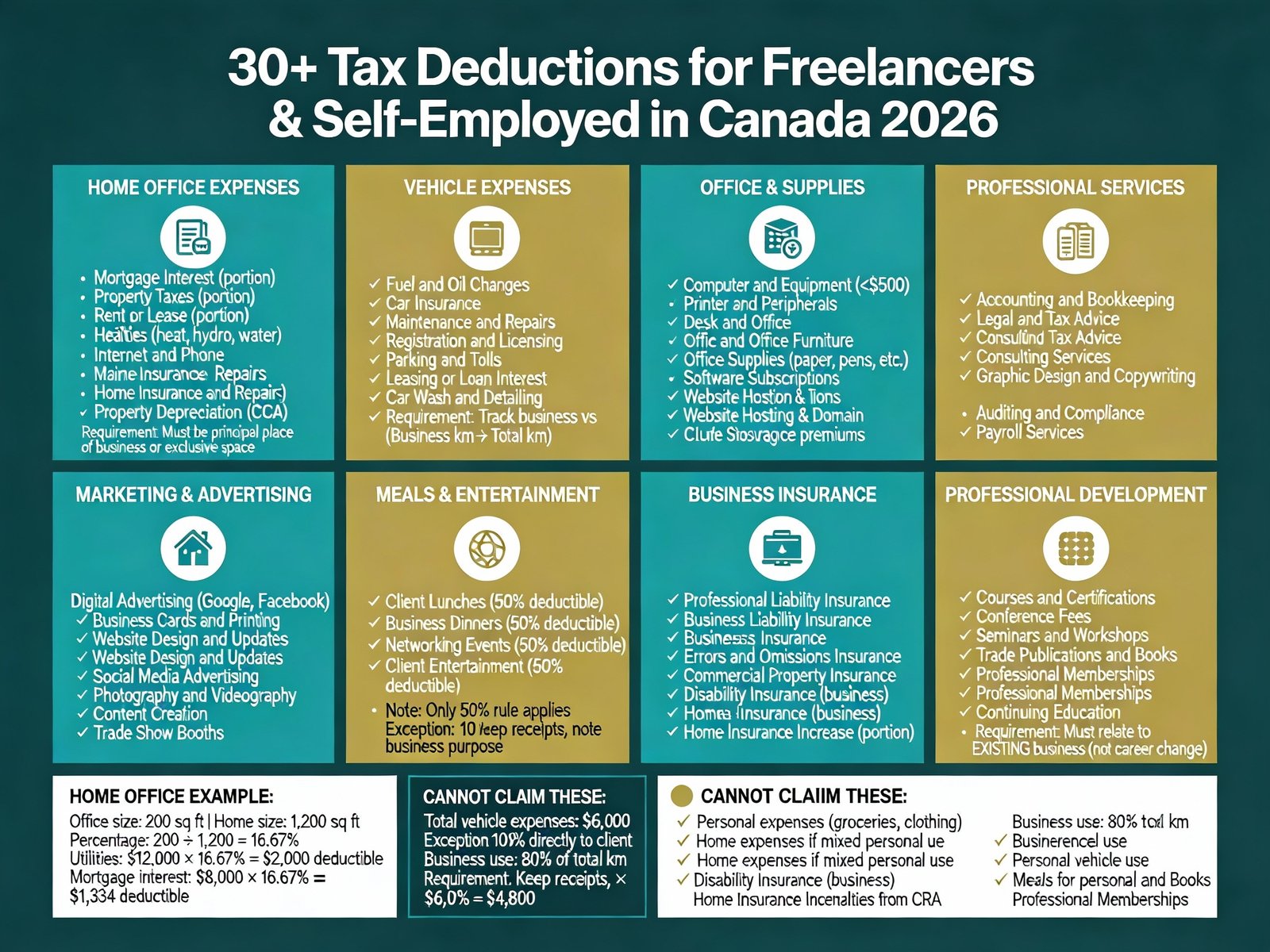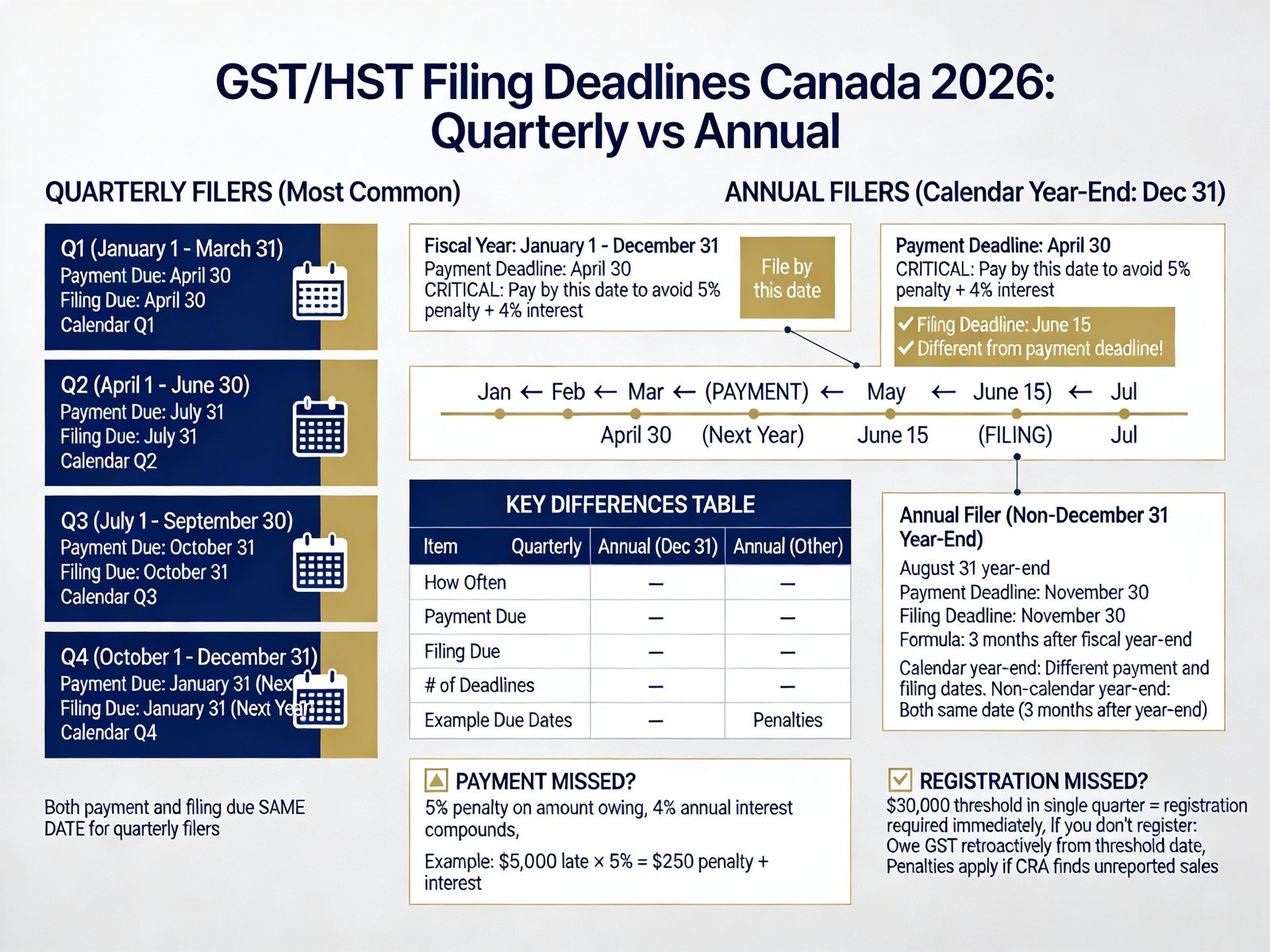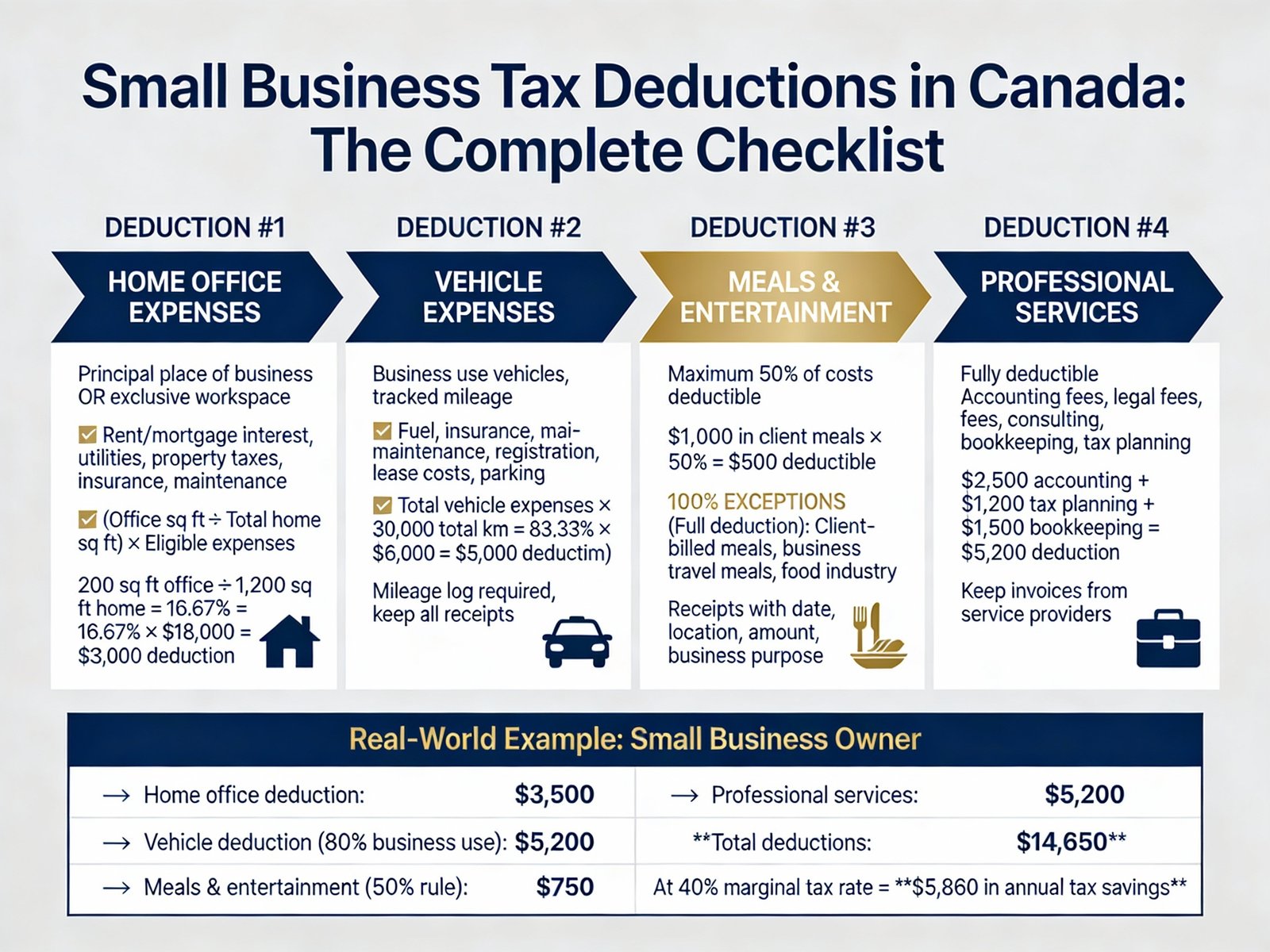Filing taxes can be a daunting task for many Canadians, with even minor errors leading to significant consequences, such as delays in refunds, reassessments, penalties, or even audits by the Canada Revenue Agency (CRA). Understanding the most common tax filing mistakes and learning how to avoid them is essential to ensure a smooth and accurate tax filing process. This guide outlines frequent errors made by Canadian taxpayers and provides practical tips to prevent them, while emphasizing the importance of accuracy in tax reporting.
Common Tax Filing Mistakes and How to Prevent Them
Here are the most common errors Canadians make when filing their taxes, along with steps you can take to avoid them:
1. Missing the Tax Filing Deadline
Error: Failing to file your tax return by the due date, which is typically April 30th for most individuals.
Prevention:
- Set Reminders: Mark the tax deadline on your calendar and set electronic reminders a month in advance.
- Early Preparation: Start gathering your documents and preparing your return as soon as you receive your T-slips and other relevant forms.
- Professional Assistance: Consider engaging a tax professional to ensure timely filing.
Example: A self-employed consultant who misses the April 30 deadline may face penalties and interest on any taxes owed. To avoid this, they should start preparing their return early and consider using automated reminders or hiring a tax advisor.
2. Incorrect Personal Information
Error: Providing wrong or outdated personal details, such as name, address, Social Insurance Number (SIN), or direct deposit information.
Prevention:
- Review Personal Details: Double-check all personal information before submitting your return.
- Update Changes: Notify the CRA of any changes in your personal circumstances, such as marital status or address changes.
Example: If a taxpayer has moved during the year and fails to update their address with the CRA, their refund may be delayed or sent to the wrong address.
3. Not Reporting All Income
Error: Omitting income sources, including employment income, self-employment earnings, investment income, or foreign income.
Prevention:
- Gather All T-Slips: Ensure you have received all T4s, T5s, and other relevant slips from employers and financial institutions.
- Track All Income: Keep detailed records of all income sources, including side gigs or freelance work.
- Include Worldwide Income: If you are a resident of Canada for tax purposes, remember to report any income earned outside the country.
Example: A teacher who tutors part-time and fails to report their tutoring income may face penalties for underreporting income. Maintaining detailed records of all earnings can help avoid this issue.
4. Incorrect Claiming of Deductions and Credits
Error: Failing to claim eligible deductions and credits or incorrectly claiming ineligible ones.
Prevention:
- Stay Informed: Familiarize yourself with available deductions and credits, such as medical expenses, tuition fees, and Registered Retirement Savings Plan (RRSP) contributions.
- Maintain Documentation: Keep receipts and records to support your claims.
- Consult a Professional: Seek advice to ensure you’re maximizing eligible deductions without overstepping.
Example: A small business owner may not realize they can deduct home office expenses. Consulting a tax professional can help them maximize this deduction while ensuring they comply with CRA guidelines.
5. Mathematical and Calculation Errors
Error: Making mistakes in calculations, leading to incorrect tax payable or refund amounts.
Prevention:
- Use Tax Software: Rely on reputable tax preparation software that automatically performs calculations.
- Professional Review: Have a tax professional review your return for accuracy, especially if your return involves complex calculations.
Example: An individual completing their taxes by hand could mistakenly add up deductions incorrectly. Using tax software would eliminate this risk by automating the math.
6. Overlooking Income from the Gig Economy
Error: Not reporting income from side jobs or gig economy activities, such as ride-sharing, freelance work, or online sales.
Prevention:
- Record-Keeping: Keep detailed records of all gig-related income and expenses.
- Report All Earnings: Ensure all supplemental income is included in your tax return.
Example: A driver for a ride-sharing service who doesn’t track their earnings may forget to report their side income, leading to underreporting. Keeping accurate records of all transactions helps avoid this mistake.
7. Improper Claiming of Business Expenses
Error: Claiming personal expenses as business expenses or not adhering to the allowable expense guidelines.
Prevention:
- Understand Eligible Expenses: Familiarize yourself with what constitutes a legitimate business expense under CRA rules.
- Separate Accounts: Maintain separate bank accounts for business and personal finances to avoid mixing expenses.
- Keep Detailed Receipts: Retain all receipts and invoices related to business expenses for verification.
Example: A freelance photographer cannot claim personal vacation expenses as business travel unless the trip is work-related. Properly categorizing expenses and maintaining receipts ensures legitimate deductions.
8. Failing to Report Cryptocurrency Transactions
Error: Not reporting gains or losses from cryptocurrency transactions, which the CRA considers taxable.
Prevention:
- Track Transactions: Keep records of all cryptocurrency trades and activities.
- Report Accordingly: Declare cryptocurrency income as either capital gains or business income, depending on the nature of the activity.
Example: A taxpayer who trades Bitcoin and fails to report their gains may face penalties. Using software that tracks cryptocurrency transactions can simplify reporting.
9. Not Claiming Carryforward Amounts
Error: Forgetting to claim unused deductions or credits from previous years, such as tuition credits or capital losses.
Prevention:
- Review Past Returns: Check prior tax returns for any carryforward amounts.
- Maintain Records: Keep notices of assessment and carryforward summaries from the CRA.
Example: A student who doesn’t use all their tuition credits in one year can carry them forward indefinitely. Failing to track this could result in lost savings.
10. Ignoring Foreign Asset Reporting
Error: Failing to report foreign property or investments valued over $100,000 CAD.
Prevention:
- Form T1135: Complete and file the Foreign Income Verification Statement if required.
- Consult an Expert: Seek professional advice for complex foreign asset reporting requirements.
Example: A taxpayer with foreign real estate worth over $100,000 who fails to report it may face hefty penalties. Filing the T1135 form on time prevents this issue.
11. Incorrect RRSP Contributions
Error: Over-contributing to your RRSP beyond your deduction limit, leading to penalties.
Prevention:
- Check Contribution Limits: Refer to your CRA Notice of Assessment for your RRSP deduction limit.
- Monitor Contributions: Keep track of all contributions, including those made through employer-sponsored plans.
Example: Contributing more than the allowable limit to an RRSP can result in a 1% monthly penalty on excess contributions. Monitoring your contribution levels can avoid this costly mistake.
12. Not Filing a Return Due to Low Income
Error: Assuming that no tax return is needed because of low or no income, potentially missing out on benefits and credits.
Prevention:
- Always File: Even if you have little or no income, file a tax return to access benefits like the GST/HST credit or Canada Child Benefit.
Example: A university student with no income may still be eligible for a GST credit by filing a tax return, ensuring they don’t miss out on valuable benefits.
13. Failing to Report Spousal Information
Error: Not providing accurate information about your spouse or common-law partner, which can affect benefit calculations.
Prevention:
- Include Spousal Details: Ensure all required information about your spouse is included, even if they have no income.
14. Not Keeping Adequate Records
Error: Lacking proper documentation to support income, deductions, and credits claimed.
Prevention:
- Organize Documents: Create a systematic filing system for all tax-related documents.
- Retention Period: Keep records for at least six years, as required by the CRA.
15. Using Incorrect Tax Forms
Error: Filling out the wrong tax schedules or forms, leading to incomplete or incorrect submissions.
Prevention:
- Verify Forms: Ensure you’re using the correct and most up-to-date forms for your situation.
- Professional Assistance: Consider using tax preparation software or consulting a tax professional.
Consequences of Inaccuracies in Tax Filing
Filing errors can have several consequences, including:
1. Delayed Refunds
Errors on your return can lead to processing delays, postponing any refunds you may be entitled to.
2. Reassessments and Adjustments
The CRA may reassess your return, resulting in adjustments to the tax payable or refunds due.
3. Penalties and Interest
Underreported income or overstated deductions can result in penalties and interest charges on unpaid taxes.
4. Audits
Significant inaccuracies increase the likelihood of a CRA audit, which can be time-consuming and stressful.
5. Loss of Benefits
Inaccurate information may affect eligibility for benefits and credits, such as the GST/HST credit or Canada Child Benefit.
6. Legal Consequences
In cases of tax evasion or fraud, legal action may be taken, potentially leading to fines or imprisonment.
7. Reputational Damage
For businesses and professionals, tax issues can harm your reputation and credibility.
Conclusion
Accurate tax filing is essential to fulfill your legal obligations and maximize your financial well-being. By being aware of common tax filing mistakes and taking proactive steps to prevent them, you can ensure a smoother tax season and avoid unnecessary complications. When in doubt, seeking professional assistance can provide peace of mind and help you navigate the complexities of the Canadian tax system.
How Bomcas Canada Accounting Firm Can Help
At Bomcas Canada Accounting Firm, we are dedicated to helping individuals and businesses in Edmonton and across Canada avoid common tax pitfalls. Our team of experienced tax professionals offers comprehensive services to ensure your tax returns are accurate, compliant, and optimized for your benefit.
Our Services Include:
- Expert Tax Preparation: We handle your tax filing with precision, minimizing errors and maximizing eligible deductions and credits.
- Personalized Advice: Receive tailored guidance based on your unique financial situation.
- Audit Support: If you’re facing a CRA audit, we provide expert representation and support.
- Year-Round Service: Tax planning doesn’t end on April 30th. We’re here to assist you throughout the year.
Contact Us Today
Don’t let tax filing mistakes cost you time and money. Trust the experts at Bomcas Canada to handle your taxes with professionalism and care.
Phone: 780-667-5250
Fax: 780-851-2520
Email: info@bomcas.ca
Website: https://bomcas.ca
At Bomcas Canada, we’re committed to making tax season stress-free and beneficial for you.










 View Our Location
View Our Location





 181 Meadowview Bay, Sherwood Park, AB T8H 1P7, Canada (Online Clients Only)
181 Meadowview Bay, Sherwood Park, AB T8H 1P7, Canada (Online Clients Only)